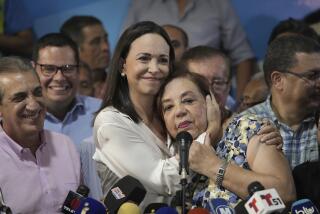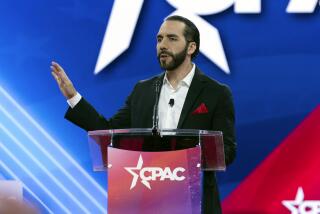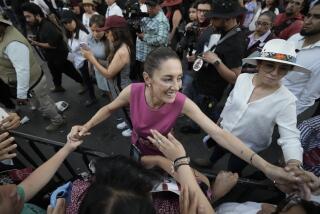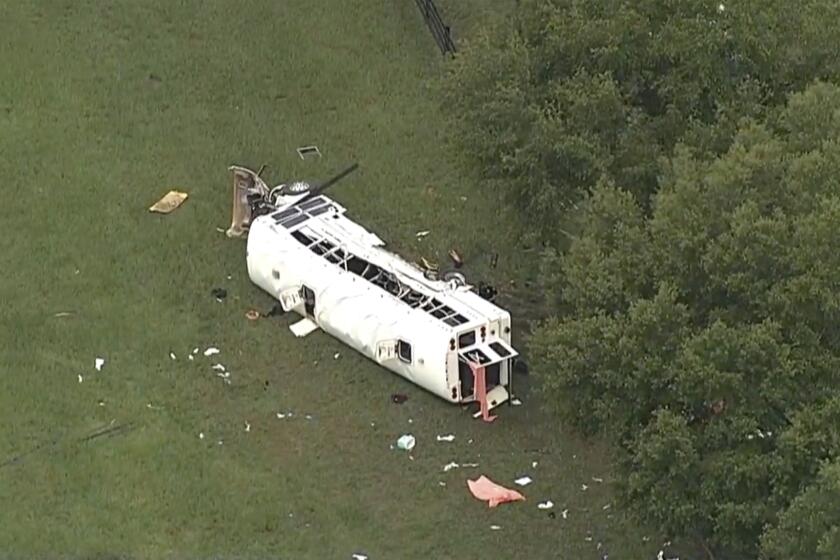Mexico’s PRI Picks Economist Zedillo to Succeed Colosio : Politics: Former Cabinet member is President Salinas’ choice as ruling party’s nominee. He pledges to uphold his slain predecessor’s ideals but faces divisiveness in ranks.
The political party that has ruled Mexico for 65 years on Tuesday named Ernesto Zedillo Ponce de Leon, a Yale-trained economist and member of President Carlos Salinas de Gortari’s inner circle, to replace its slain presidential candidate.
Zedillo, 42, automatically becomes the front-runner in the presidential election scheduled for Aug. 21. But he immediately faces the challenge of uniting a party split by a bitter power struggle. He also must overcome heated opposition from many of its militants who oppose him because he was handpicked by the president and has little political experience.
In a ceremony before a select gathering at the national headquarters of the Institutional Revolutionary Party, or PRI, Zedillo accepted the nomination and pledged to continue the ideals of the man he is replacing, Luis Donaldo Colosio.
Colosio’s assassination last Wednesday in Tijuana shocked Mexico and immersed the party in crisis. Zedillo was Colosio’s campaign manager.
“I accept (the candidacy) absolutely aware that the best man to carry the PRI to victory and to carry Mexico to its aspirations was at every moment Luis Donaldo Colosio,” Zedillo said. He swore loyally: “For Colosio! For PRI! For Mexico!”
The announcement and Zedillo’s speech were broadcast on Mexican television from PRI’s Salon de los Presidentes, where a large photograph of Colosio was prominently displayed. Zedillo mentioned Colosio’s name 39 times in the 20-minute speech.
Outside, about 2,000 rank-and-file activists, mainly from the nearby state of Mexico, stood in the blazing midday sun waving PRI placards and chanting, “Come out, come out.” Instead, a Zedillo spokesman promised them a chance to file through a multipurpose room in small groups to meet Zedillo.
Widely regarded as a brilliant but cold technocrat with little political experience, Zedillo had served as education minister before becoming Colosio’s campaign manager. Previously, as head of the now-defunct Planning and Budget Ministry, he feuded over spending policies with Finance Minister Pedro Aspe Armella.
Like Colosio, Zedillo is from a modest background. Born in Mexico City, he attended public schools, including the unpretentious National Polytechnical Institute, before doing postgraduate work in the United States.
Unlike the exuberant, striking Colosio, his successor has a professorial manner accentuated by wire-rim glasses and close-cropped hair. Zedillo is often praised for his ability to express complex concepts clearly and simply.
His selection was welcomed in world banking and U.S. business circles because Zedillo is expected to continue Salinas’ free-market economic policies, which have modernized the Mexican economy and catapulted it into the world’s largest trading bloc, in partnership with the United States and Canada.
Zedillo is well known in global financial circles because, as an official at the Bank of Mexico, he renegotiated the private sector’s international loans in the wake of the 1982 debt crisis.
The Mexican stock exchange, which had dropped 3% Monday and continued downward in early trading Tuesday, rebounded with the news that Zedillo was named. It closed slightly higher, despite the drop in international markets.
But within his own party, Zedillo may have trouble. Hard-line PRI traditionalists, who have felt their power erode under Salinas, had fought Zedillo’s appointment because he is viewed as a Salinas protege. And some of the pro-democracy reformists also opposed Zedillo because they fear that he, like Salinas, will give priority to the economy at the expense of political reform.
The manner in which Zedillo was chosen--by the dedazo, or the pointing of the big finger by Salinas, exercising the privilege that outgoing PRI presidents have claimed since the party’s founding--was a triumph for his mentor.
“Salinas won the power struggle and was able to impose his candidate,” said political analyst Denise Dresser. “But the hard-liners have not given up. The struggle within the party is not over.”
Not only the hard-liners were disappointed. Reform-minded activists also complained.
“We are disgruntled, not because of Zedillo himself, but because we are worried that a candidate selected this way cannot count on the support of the entire party,” said Ramiro de la Rosa, political action secretary of Democracia 2000, a movement of mainly young party activists bent on reform.
“A divided party will oblige us to commit massive fraud on Aug. 21 in order to stay in power,” he warned, one of the few dissenting voices at the PRI headquarters.
The question on everyone’s mind is whether Zedillo has the political savvy to unite the diverse and disgruntled in the PRI and to guide the party from its worst crisis ever to victory in August.
“Concretely, he must propose opening up his campaign team,” said economist Rogelio Ramirez de la O. “He must extend a friendly hand to all the groups that have been in the conflict and . . . maintain a less belligerent dialogue with the opposition.”
The threat of the election may also help reimpose the PRI’s renowned party discipline, Dresser said. Hard-liners, as well as other members of the PRI, know they must win the elections to survive, so they are likely to put their internal battles on hold until after August, she said.
PRI discipline was much in evidence Tuesday as busloads of rank-and-file loyalists descended on party headquarters, carrying signs some hastily drawn with felt-tip pens and misspelling the candidate’s name as “Cedillo.”
“We’re here to show our support,” said Yolanda Aquino, 45, from the northern industrial suburb of Ecatepec. Asked why she supported Zedillo, she answered, “I really could not answer that.”
But other party activists, who knew only that Zedillo had been Colosio’s campaign manager, were quite clear about their reasons for supporting the new candidate. “Colosio was our hope,” said one woman, who was swept away by the crowd before she could identify herself. “Our best revenge for his death is to win the election.”
Zedillo was sympathetic to such feelings in his speech. “I assume this responsibility with the encouragement of knowing that the Priistas (PRI faithful) are not starting a campaign; we are continuing it,” he said, adding later, “We are continuing the work begun by Luis Donaldo Colosio.”
But a telephone survey released Tuesday by the demographic magazine Este Pais found that nearly a third of the 349 people polled believe that the PRI is behind Colosio’s death and 70% expect a government cover-up of the murder. The survey has about a 4.4% margin of error.
Questions about why Zedillo was not with Colosio in Tijuana have caused such speculation that the party felt compelled to explain in a news release that the campaign manager does not normally accompany the candidate at all of rallies.
Still, Dresser said: “There will be a lot of sympathy vote. They can ride on Colosio’s wave. PRI is virtually assured of a victory now because it has a martyr.”
Even before Zedillo accepted the nomination, there were signs the healing process had begun. Party Chairman Fernando Ortiz Arana, who had been Zedillo’s principal rival for the candidacy, said early Tuesday that he was withdrawing from consideration in the interest of party unity.
That action was much more like the traditional PRI than the months of open bickering between Colosio and rival Manuel Camacho Solis or the six days that followed the assassination, when different factions openly supported various candidates.
“Any conduct motivated by personal ambitions can provoke divisions in the heart of our party,” Ortiz Arana said. “Any dissipation of PRI forces implies a serious risk for the (party’s) union and stability. Especially in these times, it is absolutely necessary to maintain ourselves closely united.”
That was the sort of attitude that the new candidate asked for a few hours later. “We must take from the tragedy a lesson in unity,” Zedillo said, “in the strength in diversity, the nobility of the contest, brotherly respect and political civility.”
* CHALLENGES FOR ZEDILLO: Zedillo must focus on social problems, analysts say. D1
Profile: Ernesto Zedillo
Background on the PRI’s choice for president:
* Age: 42
* Background: Born in Mexico City and raised in Baja California and Mexico City; son of an electrician.
* Education: Economics degree from the National Polytechnical Institute in 1972; earned master’s and doctoral degrees in economics at Yale in 1978.
* Career: Worked in the Luis Echeverria administration and in state banks in the 1970s and 1980s; Joined the Salinas administration as head of the now-defunct Planning and Budget Ministry; became education secretary in 1992, in charge of a program to modernize Mexican education but was caught in uproar over the government’s efforts to rewrite history textbooks in a way that critics said minimized the role of past revolutionary heroes; was named campaign manager for Colosio last November.
* Personal: Married to Nilda Patricia Velasco Nunez, also an economist; four sons and one daughter.
Sources: Institutional Revolutionary Party and Diccionario Biografico del Gobierno Mexicano
More to Read
Start your day right
Sign up for Essential California for news, features and recommendations from the L.A. Times and beyond in your inbox six days a week.
You may occasionally receive promotional content from the Los Angeles Times.







